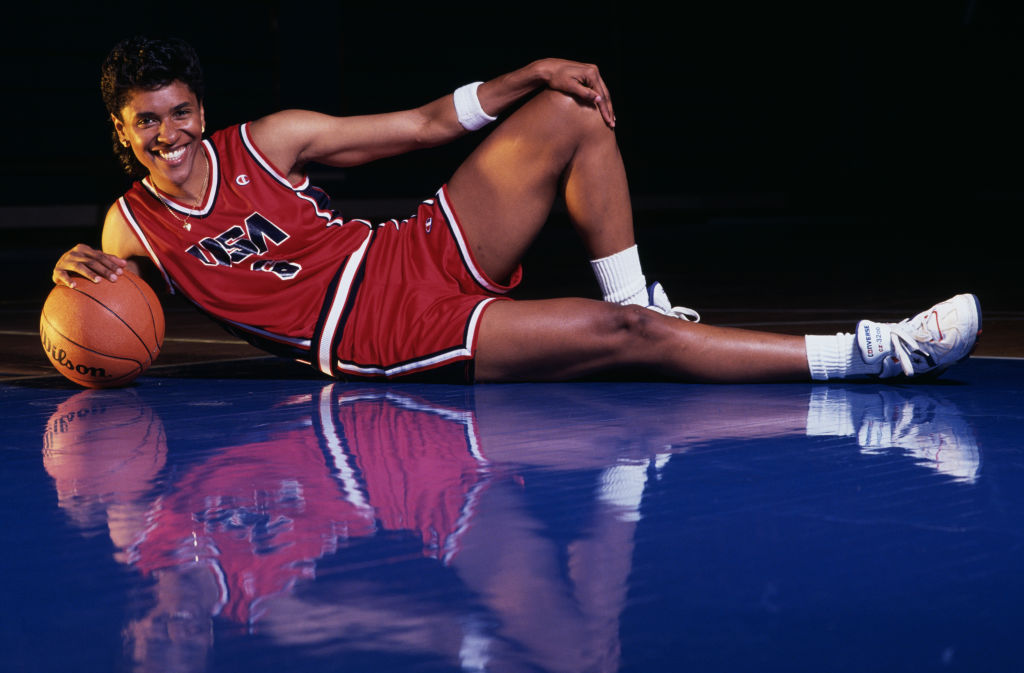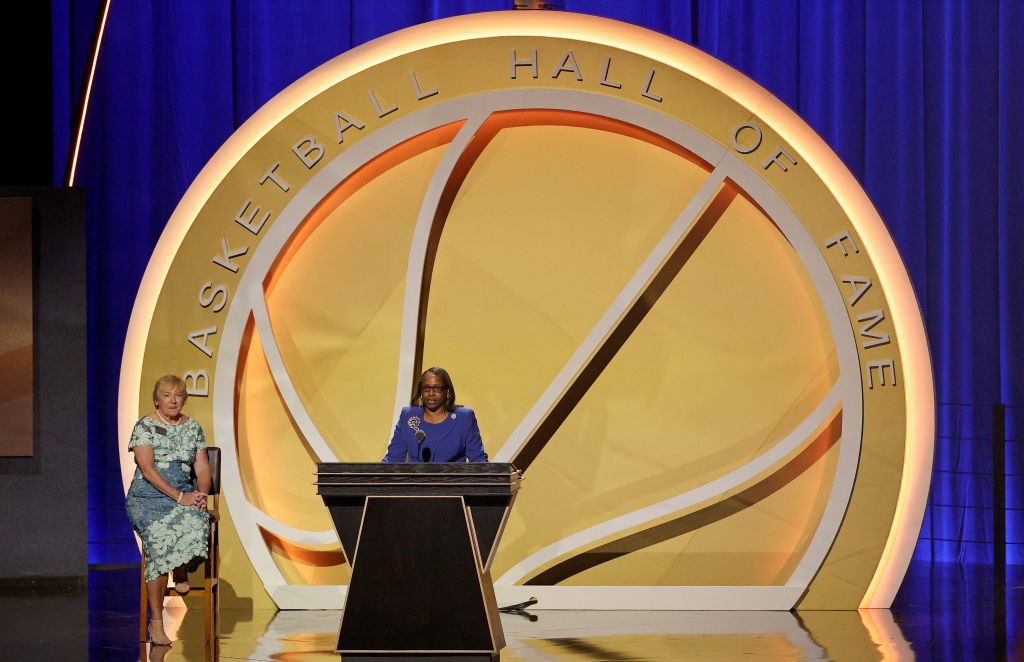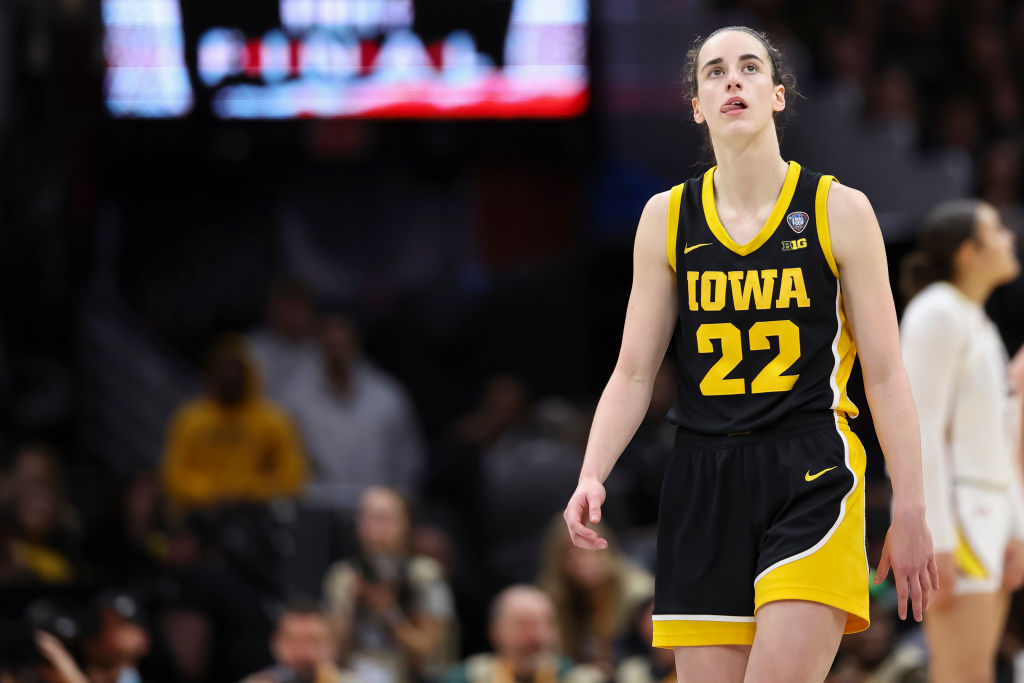Keep That Same Energy: Remembering The Impact Of Black Women When Discussing Caitlin Clark

United States
Breaking News:
Washington DC
Friday, May 3, 2024


Lynette Woodard #6, Point Guard for the United States women’s basketball team during a portrait photo session circa 1990. | Source: Tony Duffy / Getty
Caitlin Clark is an undeniably talented basketball player. She is a prolific shooter, reminiscent of Steph Curry as they both like to shoot from various logos. Her ability to suddenly change the trajectory of a game is fascinating. And her passion and love for the game are contagious. It is irrefutable that Clark’s success has attracted many people who otherwise may not have been tuned in to college basketball, thus increasing the ratings and viewership exponentially.
As former college basketball players, we are grateful that more eyes are watching, respecting and enjoying women’s college basketball. However, we are equally troubled by the manner in which the history of women’s basketball has been inaccurately represented during the Caitlin Clark craze.
Prior to the creation of NCAA women’s basketball, the Association of Intercollegiate Athletics for Women (AIAW) existed. Two former players, Lynette Woodard (3,649) and Pearl Moore (4,061) scored more points than Caitlin Clark (as of mid-February 2024). Since then, Clark did break Woodard’s record. However, there has been very little media attention on the great contributions of Woodard and Moore to the game of basketball. It is almost as though they have been erased from history. Far too often, the contributions of black women are seemingly wiped from the history books. Woodard and Moore collectively praised Clark for her scoring prowess, although Woodard did feel the need to distinguish her record from Clark’s. Doing so was not a criticism. Rather, it was a plea to remember not to forget.
By contrast, while coaches like Tara VanderVeer, Pat Summit, and Geno Auriemma were given credit for their wins during the AIAW era, players were not given credit for points scored. Although Caitlin Clark has since bypassed Lynette Woodard’s record, the argument remains that if we are going to count the wins for coaches, the NCAA should count the points for players.
How can we keep fans informed and engaged? Certainly, we do not have to mention all of the greats whenever there is a new phenomenon on the horizon, but they should be lauded for the path they paved. Remember Cheryl Miller, Sheryl Swoopes, Chamique Holdsclaw, Georgeann Wells, and Ayoka Lee? Consider these game-changing accolades: Miller’s leaving USC as her school’s all-time leader in points, rebounds, steals, field goals made, and free throws made; Swoopes scoring the current NCAA title game record of 47 points in a victory, and later becoming the first female athlete to have a signature shoe from Nike; Holdsclaw, an unparalleled player on every level, being the first female athlete to grace the cover of SLAM magazine and doing so while a college athlete; numerous NCAA players — all of whom are Black — dunking during competition, with Georgeann Wells being the first; and two years ago Lee scored 61 points in a college contest. Very few pundits detail Wells and Lee’s accomplishments. And this is exactly why we have to be intentional about the discussions surrounding all players — Clark included — who are changing the game. It is imperative that we do. The excitement and enthusiasm we have for Clark, which has been nothing short of transformational, must be maintained for the Black women giants of the past, present and future. Women’s college basketball has been catapulted forward with each one’s individual gift; therefore, their legacies must remain in the conversation. If we want to see the game continue to grow, we have to embrace history and simultaneously challenge the way in which past, present and future interact.

Pearl Moore speaks during the 2021 Naismith Memorial Basketball Hall of Fame ceremony presented by Sylvia Hatchell at Symphony Hall on September 11, 2021, in Springfield, Massachusetts. | Source: Maddie Meyer / Getty
Do fans of Clark or members of the media “keep this same energy” for Juju Watkins? Or for South Carolina’s multiple championships? Or for Aliyah Boston when she won POY and DPOY? Are these fans equally ecstatic for Dawn Staley and the South Carolina Gamecocks for having an undefeated season that obliterated expectations? Did these same fans shout with glee when LSU, a predominately black team defeated Iowa in the National Championship in 2023?
If nothing else, the basketball community has a responsibility to collaboratively move the game forward. At this particular juncture, the task is less arduous since so many eyes are on the game of women’s basketball. When we honor the Caitlin Clarks of the sport, we must also praise the Angel Reeses, as both have galvanized the fanbase. Now is the time to maintain racial parity when discussing greatness on the court. Female basketball players are creating a new landscape, ushering in novel approaches to leadership on and off the court, and demonstrating sisterhood along the way. While the media has the power to support this collective energy, it is spectators who must have the resolve to hold them accountable. After all, what would the future of the women’s coverage be without the likes of Watkins, MiLaysia Fulwiley, Hannah Hidalgo, Madison Booker, and even Paige Bueckers? The answer is simple: an erroneous picture that is failing to acknowledge the explosive growth and interest in women’s college basketball.

Caitlin Clark #22 of the Iowa Hawkeyes looks on against the South Carolina Gamecocks during the NCAA Women’s Basketball Tournament National Championship at Rocket Mortgage Fieldhouse on April 7, 2024, in Cleveland, Ohio. | Source: Justin Tafoya / Getty
Two things can be true: Caitlin Clark, an undeniably talented player, will have a tremendous impact on the viewership of women’s basketball. And, there are many Black women, past and present, who have and will continue to change the game. The season has ended, but the collective conversation is primed to continue in college basketball and the WNBA.
Jewel Clark is a former Penn Women’s Basketball Player (‘04). Jewel was most recently named a Legend of Ivy League Basketball in 2022. She was the 2003-04 Ivy League and Big 5 Player of the Year. Jewel was only the second player in Penn’s women’s basketball history to be named three-time first-team All-Ivy and first-team All-Big 5. She was a member of Penn’s first two Ivy League championship teams, and concluded her career second on Penn’s all-time scoring list (1,743 points), third in rebounds (933), and fourth in career steals (204). Jewel still holds the program records for free throws made in a game (16 vs. Drexel in 2002) and career (475). Jewel currently resides in Maryland and works as the Athletic Academic Advisor and a dual-certified public school teacher. She is also the Assistant Athletic Director and high school girls’ basketball coach.
Rachel Wilson Patterson is a former Penn Women’s Basketball Player (‘06). In 2005-06, Rachel was an Academic All-Big 5 selection, First-team Arthur Ashe Scholar Athlete, Winner of Penn’s Makuu Black Cultural Center Althea Gibson Award, and received the team’s Hustle Award. Since graduating from Michigan Law in 2011, Rachel has focused on diversity, equity and inclusion initiatives with non-profit organizations, pipeline programs, law schools, and the legal profession. Rachel currently resides in Washington, D.C., and works as a DEI professional.
SEE ALSO:
Here’s Why Dawn Staley Is Truly The GOAT
Jason Whitlock Defends Caitlin Clark From ‘Racists’ While Hating On Black Women In Sports